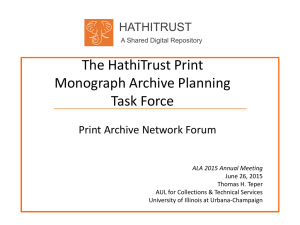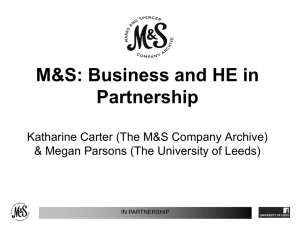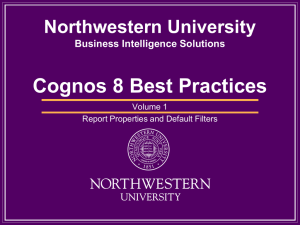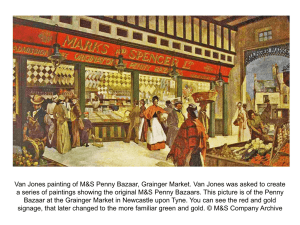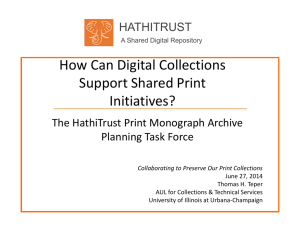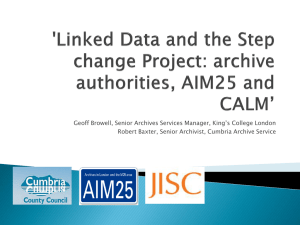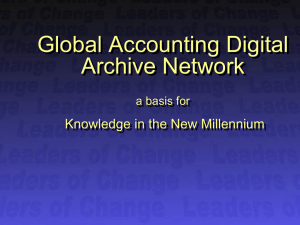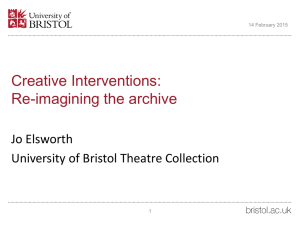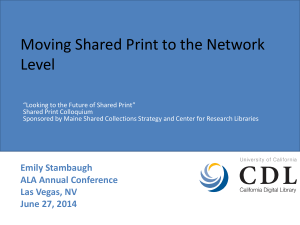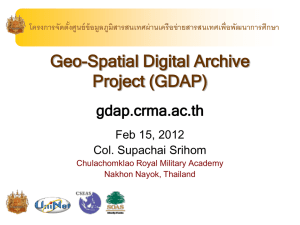11_Hathitrust_Teper (Presentation)
advertisement
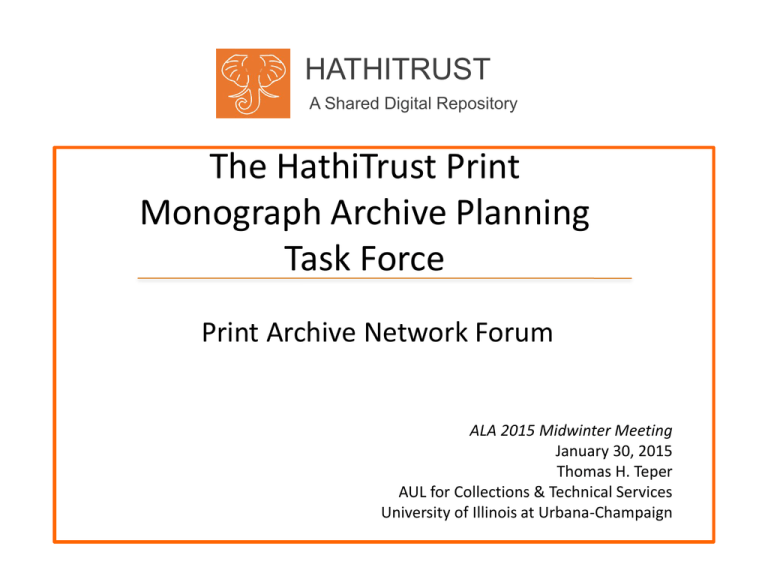
HATHITRUST A Shared Digital Repository The HathiTrust Print Monograph Archive Planning Task Force Print Archive Network Forum ALA 2015 Midwinter Meeting January 30, 2015 Thomas H. Teper AUL for Collections & Technical Services University of Illinois at Urbana-Champaign Membership • • • • • • • • • • Clem Guthro, Colby College Bob Kieft, Occidental College Erik Mitchell, UC-Berkeley Jake Nadal, ReCAP Jo Anne Newyear Ramirez, British Columbia Matthew Revitt, Maine Matthew Sheehey, Brandeis (formerly Harvard) Emily Stambaugh, California Digital Library Karla Strieb, The Ohio State University Thomas Teper, Univ. of Ill. at Urbana-Champaign (Chair) Hathi’s Mission & Goals • Mission: To contribute to the common good by collecting, organizing, preserving, communicating, and sharing the record of human knowledge • Goals: To stimulate redoubled efforts to coordinate shared storage strategies among libraries, thus reducing long-term capital and operating costs of libraries associated with the storage and care of print collections. (one of seven) The Print Monographs Archive Planning Task Force • Ballot Initiative passed at the 2011 HT Constitutional Convention (Con-Con) – “To develop a print monographs archive corresponding to volumes represented within the HathiTrust” • HathiTrust Board of Governors approved appointment of a PSC-designed task force to begin planning in June 2014 – Calls every other week with two face-to-face meetings in October 2014 and one in January 2015 Ballot Initiative Called For…. • A print archive founded on formal agreements with print repositories of member institutions or their affiliated agents • Agreements that would establish retention commitments to ensure continuing availability of the archived holdings to the HT members • Provision of financial support to the designated repositories sufficient to secure and maintain these agreements • The initiation of a formal planning process by which necessary policies, operational plans, and business models required would be established to sustain a distributed archive Among the issues to examine… • Exploration of the model needed to identify and preserve print resources • Qualifications of participating repositories • Analysis and identification of appropriate content for inclusion in the archive • Additional criteria for participation, such as geography, repository type, breadth of contribution, institutional commitment… • Retention periods • Discovery, access policies, and service models • Business and financial models • Roles and relationships among HT and other libraries and organizations engaged in collaborative management of print collections. Founding Assumptions • The archive will mirror the monographic holdings of the HT digital archive, will be built from the collections of HT members, and will serve the members; • The archive will be distributed for security purposes, which means that a potentially large number of libraries could participate; • The archive will be persistent and preserve the print record; it is thus continuous with the mission of the digital archive and the historic mission of many HT members with respect to analog materials. HT will be a leader in print archiving as it has been in digital preservation; • The archive will be governed, managed, further developed, and financially supported by the Trust, not by a subset of members; • The archive’s existence represents a “new paradigm by which research libraries and other academic libraries can develop shared reliance on a scholarly print record that is collaboratively stewarded and supported as a public good.” Task Force proposal… • Defines the character of the repository as… – A collection that mirrors HT’s monographic holdings, is distributed and “light” – A repository that is governed, managed, and supported by the HT as a whole, not a subset of members – A repository that is relatively lightweight and focused on lowering barriers for early participation Task Force proposal… • Defines the development of the repository as… – A phased process that seeks, in phases one and two, to launch the repository and match commitments for 50% of the titles – A process that, in phase three, will build out the infrastructure, including more advanced access services – A process that, in phase four, will seek to operationalize services to support continued growth. Task Force proposal… • Defines the national role of the repository as… – Providing leadership in the area of monographic, print retention. – Supporting the development of the technical infrastructure necessary to disclose commitments and discover content. – Providing services to members that support their efforts to make local collection management decisions Building a Foundation to Accrue Advantages • The repository will serve as the foundation for making local retention/withdrawal decisions. • The program will provide members with tools to support collection management/development decisions. • The program will provide transformative services to sight-challenged users. • The program will provide the means to establish prospective retention and digitization commitments for newly published literature. Conclusion • Our proposal is grounded in a set of assumptions: – We believe that collaborative management of print is important – We believe that libraries need to preserve ongoing access to the print record – We believe in sharing. • By working together, our members believes that Hathi’s nation-wide organization can reshape the collections landscape, redefine how libraries build and manage collections, and support member institutions as they seek to meet the changing needs of the readers and scholars they serve. Thank You
